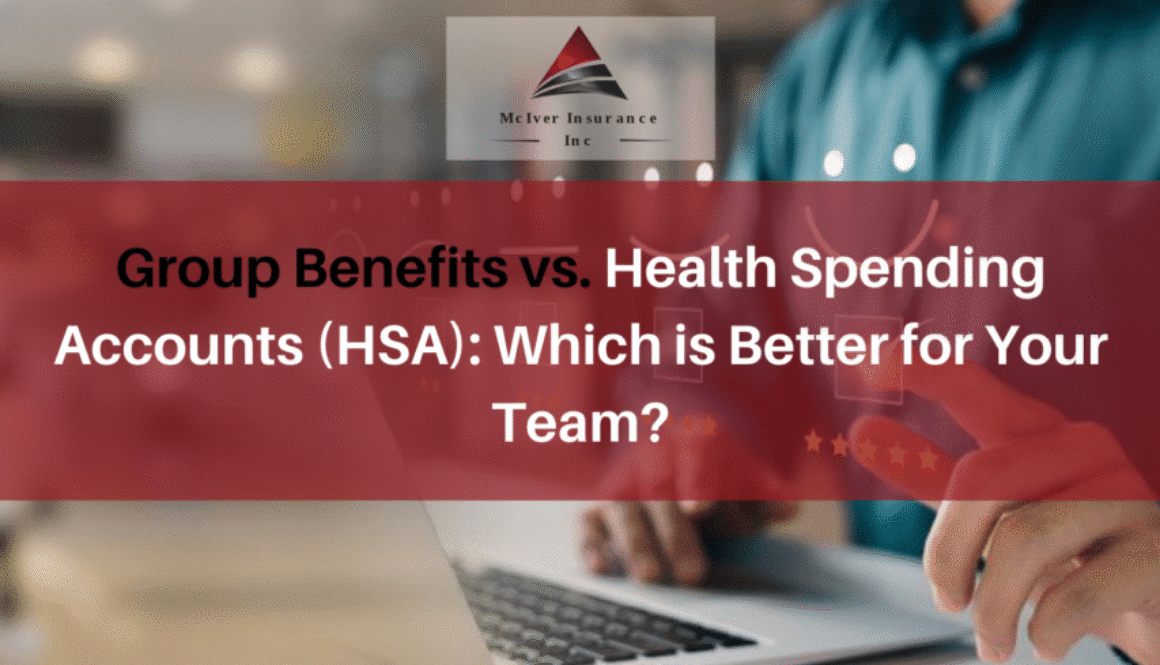Group Benefits vs. Health Spending Accounts (HSA): Which is Better for Your Team?
41% of Canadians receive benefits through an employer plan, whether that be through group benefits, health spending accounts, or a combination of both.
But what are group benefits and HSAs? How effective are these plans in helping attract and retain top talent? And which is better for your team?
Let’s find out!
Key Takeaways:
- Understanding the pros and cons of Group Benefits and HSAs
- Learning about the financial impact of employer plans on employers and employees
- Discovering the flexibility and tax perks of each option
What Are Group Benefits and HSAs?
Group Benefits
Think of group benefits like your go-to order at your favourite pub — dependable, bundled, and satisfying.
Traditional group benefits plans include health, dental, and vision coverage, as well as added benefits such as life insurance, disability insurance, critical illness insurance, and accidental death and dismemberment, all wrapped up in one comprehensive plan.
Companies and businesses that offer group benefits tend to be more appealing to employees than those that don’t.
Not too long ago, only larger companies offered group benefits, as these plans were traditionaly expensive and complex.
However, with the help of plans like Medavie Blue Cross, group benefits are now attainable for businesses with even 2-10 employees, allowing businesses of all sizes to protect their most prized assets, their employees.
Health Saving Accounts (HSAs)
HSAs are a bit different. They aren’t as comprehensive, complex, or expensive as group benefits, but allow for more flexibility and cost control.
Think of HSAs like giving your employees a healthcare gift card that they can use however they want — from massages and therapy at a Dartmouth wellness clinic to new glasses from a Halifax optometrist, there are no restrictions.
The way HSAs work is similar to any savings account. You (the business owner) set a yearly allowance, say $1,500 per employee. Employees can then spend their allotted allowances on eligible medical expenses up to that dollar amount.
HSAs have been gaining a lot of popularity recently as they offer a more simplistic, affordable, and tax-advantageous way for small to medium-sized businesses to provide employees with flexible health benefits.
The Benefits & Drawbacks of Each Plan?
Group benefits and HSAs come with their own set of pros and cons.
Pros: Group Benefits Plan
- Offer much broader coverage, including life insurance, disability insurance, etc.
- The beefier the benefits plan, the more appealing it is for employees, which helps employers with talent acquisition, improved retention rates, and greater loyalty.
- Premiums are fixed for the year, which makes budgeting predictable and easier for employers.
- Benefits are received tax-free for employees, and contributions made are tax-deductible for the business.
Cons: Group Benefits Plan
- Tend to be more expensive than HSAs, as traditional group benefits usually offer added coverage such as life insurance and disability insurance.
- Premium rates are revised annually, making predicting cost year-over-year challenging, especially for smaller businesses.
- Less flexibility and customization options for employees as plans are generally predefined.
- Come with age restrictions. Employees over 65 are usually not covered or have reduced coverage.
- Plans can be complex with a lot of fine print that makes it difficult for most employees to fully understand the benefits they are entitled to.
Pros: HSAs
- Funds can be used for a wide range of health-related expenses.
- Offers inclusive coverage as it doesn’t restrict benefits based on age or pre-existing medical conditions.
- Fixed contribution amounts make predicting costs a lot easier for employers.
- Employers only pay for expenses incurred, thus avoiding paying for unused coverage, which is often the case with group benefits.
- Benefits are received tax-free for employees, and contributions made are tax-deductible for the business.
- Straightforward, flexible, and highly customizable.
Cons: HSAs
- Does not offer any type of insurance to cover unexpected and large medical expenses.
- Not as appealing to employees as group benefits.
What Does Each Plan Cost You as an Employer?
While it is true that traditional employer group benefit plans were a lot more complex and often too expensive for small businesses to consider, this is no longer the case.
There are plenty of insurance providers today that offer tailor-made group benefit plans for smaller-sized businesses that are competitively priced, offer extended health benefits, include no deductibles or lengthy medical forms, and are completely digitized, making them easy to navigate, set up, and manage.
As far as how much group benefits cost? That depends on many factors that are best discussed with a professional. Click here to book an appointment or request a free quote.
On the other hand, when it comes to HSAs, you call the shots. You set the budget and that’s it. That’s your total spend. No unpleasant premium hikes to worry about.
Which is Better for My Team?
That depends on the size of your business, your budget, and your employee needs.
Group Benefits can be ideal if you predominantly have employees with families, as comprehensive coverage can act as a huge incentive for them to stay long-term.
HSAs are ideal if you have a smaller business that hires younger employees who aren’t married or have children. Group benefits wouldn’t add much value to such a demographic, but having an allowance that allows them to choose how they want to spend their health dollars can be a lot more appealing.
Team size matters as well. So does budget.
Small local businesses often love HSAs as they are simple, affordable, and easy to manage and control. However, as your business grows, investing in a group benefits plan can almost become a necessity, especially if your competitors are already offering it to their employees.
What About a Hybrid Model?
If you are still undecided on which plan is best, you can opt for a plan that includes a combination of the two.
A hybrid model allows you to offer employees an HSA with insurance add-ons or group benefits with an HSA, often referred to as a Health Care Spending Account (HCSA).
Offering a hybrid model can have many advantages, as it can offer basic insurance coverage but also greater flexibility in terms of how employees can spend their health allowance.
This model is gaining traction as it offers a win-win solution for both employees and employers.
Give Your Team the Protection They Deserve!
Whether you are considering group benefits or HSAs for your business, consult with a trusted group insurance broker.
An insurance broker can help your business find a benefits plan that is the right fit for you and your employees.
At McIver Insurance Inc., we specialize in group benefit plans for small to medium-sized businesses in Nova Scotia. We’re local, experienced, friendly, and know what works for Nova Scotia businesses.
Book a call with us today to learn more!
FAQs
Q1) What’s the main difference between Group Benefits and HSAs?
Group Benefits offer comprehensive coverage, including insurance, whereas HSAs are simply a health allowance that employees can use on health services that matter most to them.
Q2) Are there tax advantages?
Both plans offer tax deductions for employers and tax-free reimbursements for employees.
Q3) What should small business owners consider?
They should consider the employee needs, budget, team size, competition, and future goals.









